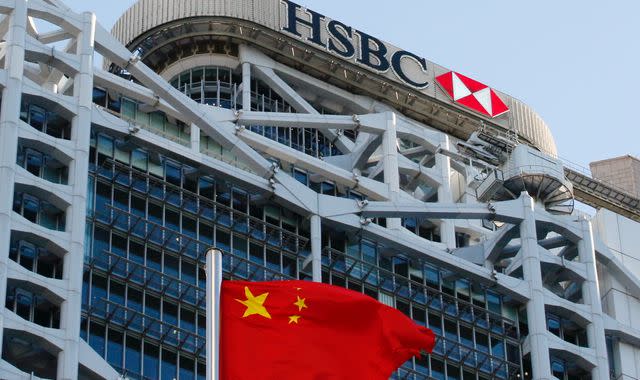HSBC achieves record profits but sweats on China woes

Higher interest rates helped HSBC achieve record annual profits last year but the sum was dented by the economic slowdown in its biggest growth market.
The company's share price fell at its sharpest rate since the early days of the COVID-19 pandemic, despite Europe's largest lender, which is UK-based but largely Asia-focused, reporting pre-tax profits of $30.3bn (£24bn) for 2023 - a 78% rise on 2022's sum.
The share price was down 8.38% on Wednesday, recording its biggest daily drop since it plunged 10% on 1 April 2020.
While much of the profit rise can be attributed to rising rates - a consequence of central bank action to tackle inflation peaking during the year - HSBC also admitted it was cautious on the loan growth outlook over the first half of 2024.
That can be partly blamed on higher rates in Europe. However, HSBC is also heavily exposed to the problems in the world's second-largest economy.
Money latest:
Britons are not using all their holiday days - and these industries are the worst
While China recovered initially from the delayed easing of COVID restrictions, a debt crisis in the real estate sector has spread to hit investment and spending more widely.
At the same time, its powerhouse manufacturing sector has also experienced a big drop in demand due to the cooling in the global economy.
HSBC's bottom line failed to meet analysts' expectations.
The profit figure was dented by a $3bn writedown on its stake in China's Bank of Communications as lenders across China are hit by widening loan losses and a crackdown on credit ordered by the authorities to tackle debt piles.
Despite the challenges, HSBC's performance allowed the bank to raise its bonus pool and shareholder rewards.
It announced a $2bn share buyback and total dividends for 2023 of $0.61 per share.
HSBC added that it would consider a special dividend of $0.21 per share in the first half of 2024 once it had completed the disposal of its business in Canada.
HSBC also revealed a new variable pay scheme for junior and middle management staff.
It was the third London-listed lender to update on its 2023 progress.
NatWest reported a 20% increase in profits last week despite troubles behind the scenes including the fallout from the Nigel Farage debanking scandal that forced out the then chief executive Dame Alison Rose.
Barclays' earnings were hit by a weaker performance from its investment banking arm.
It responded to investor concerns over its reliance on that division by announcing a shake-up of its operations.
Read more from Sky News:
Ratcliffe completes Man United purchase
Body Shop to shut almost half its stores
Neil Shah, executive director of content and strategy at Edison Group, said the share price pressure was directly linked to the troubles in China.
"This scenario is not unique to HSBC; other banks, like Standard Chartered, have also faced significant impairments due to their Chinese exposures," he wrote.
"The situation is exacerbated by a slowing Chinese economy, a property crisis, and weak consumer confidence, prompting Beijing to explore additional economic stimuli.
"HSBC's cautious approach, including a $3.4bn provision for expected credit losses, of which $1bn is attributed to mainland China's commercial property exposure, indicates a prudent recognition of the risks involved."
Commenting on its results, chief executive Noel Quinn said: "Our record profit performance in 2023 enabled us to reward our shareholders with our highest full-year dividend since 2008, three share buybacks last year totalling $7bn, and a further share buyback of up to $2bn.
"This reflected four years of hard work and the strength of our balance sheet in a higher interest rate environment."


